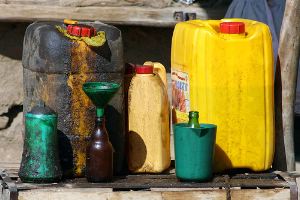 Workers of the National
Bus Company astonished passengers when they used water buckets to fuel their
bus as a fuel shortage continues in most parts of Malawi. It happened on
Christmas Eve at Lilongwe bus depot in the capital city of Malawi.
Workers of the National
Bus Company astonished passengers when they used water buckets to fuel their
bus as a fuel shortage continues in most parts of Malawi. It happened on
Christmas Eve at Lilongwe bus depot in the capital city of Malawi.
Crew carried diesel fuel in these buckets. Passengers, who were already on board, commented that carrying the diesel fuel in water buckets was surely a means of eluding authorities.
It
is illegal to buy fuel from filling stations using fuel cans, "jerry cans" or anything apart
from directly fueling at the pumps.
The only people exempt from this rule are those operating maize mill businesses or have power generators. They are required to register with the Malawi Energy Regulatory Authority (MERA) to be given a license allowing them to carry fuel cans.
Ernest Soko, a bus entrepreneur, admitted that fuel shortages have negatively affected his business. In a related development, Alex Botha, a car salesman said he was arrested in November for being found in possession of a 200-liter drum of diesel fuel.
Still,
the law makes things impossible for entrepreneurs and their Plan 'B' to survive
this grave fuel shortage is to rely on black markets, which are usually situated
in border areas like the popular Tsangano turn-off, bordering Malawi and
Mozambique. The major drawback is that such black markets are known for selling
fake fuel which is a combination of normal diesel fuel and kerosene.
This
can damage vehicle engines as proved recently when a Scania Marco polo bus travelling
from Blantyre, the southern city of Malawi, to Lilongwe broke down a few
kilometers after fueling at the black market.
Efforts to speak to the Malawi Energy Regulatory Authority (MERA) proved futile as phones are amidst the festive season.

